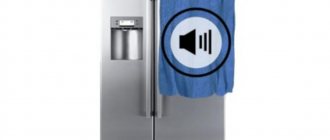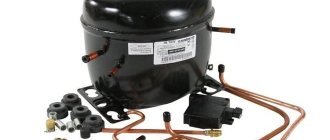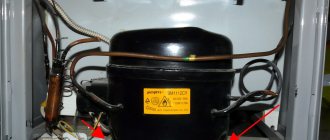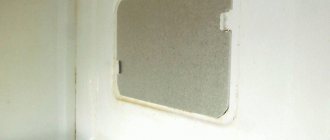Design and operating features of the refrigerator
A key part of refrigeration equipment is the compressor, which is responsible for pumping coolant through a pipeline through the condenser and evaporator. An evaporator means a special grille with a coil located inside the appliance (in most cases, at the back of the freezer or near it). In the progressive systems Bosch, Atlant, LG, Indesit no frost, the unit is similar to the radiator of a car heater. Its task is to transfer thermal energy to the surrounding space.
The capacitor can be in an open or closed configuration. The first type is found in old domestically produced models, and the latter - in modern progressive refrigerators. It is located outside the chambers and provides heat transfer.
The compressor operates periodically. The lower the temperature in the cooling chambers, the more efficiently and longer the part will function. When you turn on this device, you can see a drop in the voltage readings in the network. This leads to a short-term decrease in the brightness of incandescent lamps.
If you notice that your refrigerator is making a lot of noise, the compressor or transformer may have stopped working. In old Soviet devices, stopping a part is accompanied by a strong roar and vibration, since there is an electric motor inside the unit that ensures the movement of the piston.
Such a unit will emit strong vibrations, so hangers, springs or rubber foot pads are placed under the compressor. But how to solve the problem if the refrigerator is making a loud noise? First things first!
Refrigerator noises not associated with a malfunction
GOST 16317-87 defines the permissible noise level from household appliances at 55 dB. This noise can be compared to a conversation between two people - it is quite loud. Although operating practice shows that the noise from the refrigerator in modern models does not exceed 40 dB.
The causes of increased noise may be hidden not only in breakdowns or malfunctions of components and parts of the refrigerator. Often noise can be eliminated without interfering with the internal workings of the device. If the refrigerator is loudly humming, knocking, making clanging or crackling noises, this may not necessarily have catastrophic consequences.
When the noise is within normal limits
The noise level of a refrigerator compartment is measured in decibels (dB). The normal value ranges from 25 to 50 dB. The low level is 25-34 dB, and the middle level is 35-44. If the refrigerator begins to hum strongly, making constant noise, the level rises to 44 dB or higher.
If the device is constantly loud, the compressor may be out of order, or there is a manufacturing defect in the equipment.
Therefore, if the device begins to start up suspiciously, crackle or make a strong rumble after switching on, it is necessary to measure the current noise level and compare it with the manufacturer’s recommended one.
View » Why the upper chamber of the Hotpoint-Ariston refrigerator does not freeze
These indicators can be found in the instructions or on the brand sticker. The values are checked using a sound level meter by a specialist or independently. The whole process comes down to pre-setting the measuring device to the range of 50-100 dB, after which the device is placed near the refrigerator and started up.
Transport bolts and compressor mountings
The compressor vibrates strongly during operation, and manufacturers, wanting to reduce the assembly time of devices, abandon bolts and use fastening by bending parts of the housing. This fastening is weakening. Experts recommend tightening the compressor mount, or even securing it additionally with wire or cable ties to reduce vibrations. If the fastening is bolted, try to tighten them.
On a note! When purchasing a new refrigerator, you need to carefully read the operating instructions - it should say that before turning the device on, you need to unscrew all the transport bolts of the compressor, because they can also lead to increased noise levels.
Why is the refrigerator noisy?
If you are wondering why the refrigerator is noisy and how to fix this problem, you should consider the main causes of the unpleasant phenomenon. Experts note that the device may make noise due to the following factors:
- Incorrect installation of equipment or misalignment.
- Refrigerator overheating. The device heats up when there is not enough air.
- Malfunctions of the ventilation system.
- Power supply problems.
- Problems with shock absorbers.
- Loosening of fasteners.
Installation rules violated
If you bought a new refrigerator, and it began to click, crackle and make noise like the old one, the device may not be level. If misaligned, the compressor begins to come into contact with the housing, metal surfaces or other components, causing the refrigerator to crackle or begin to hum. It is not difficult to understand why the device clicks. In addition, one of the legs may become suspended in the air, and the device will no longer receive the required support, so the case will make vibrations and unpleasant noise.
To make sure that the hum is due to incorrect position, it is enough to check the vertical and horizontal installation of the unit using a level.
Having determined why the refrigerator is humming, it is enough to set its position using a spirit level (building level). If it is missing, you can use a plumb line. Making such a device is quite simple, using thread and a weight weighing 20-50 g. In addition, you should check the points of contact of the legs with the floor. If the surface is uneven, just adjust the height of the legs.
Lack of air
If your refrigerator is noisy and humming when you first turn it on, the compressor may not be getting enough air. The problem often occurs in rooms with a lack of free space, especially in small apartments filled with furniture.
If the refrigerator is placed too close to the wall or is furnished with massive furniture, the radiator will no longer cool properly, which will lead to increased negative impact on the compressor. As a result, the device will begin to hum, the valves will knock, and the engine will vibrate, transmitting the rumble to neighboring parts. Ice may also appear on the capacitor, which will come into contact with other parts of the equipment, making noise.
To remove the unpleasant hum, just move the device 20 cm away from the wall and rearrange nearby pieces of furniture or other structures. In addition, the back surface should be cleaned of dust, dirt and debris. It is also important to prevent contamination and care for the refrigerator at least once a month. You can perform such actions yourself without calling professional craftsmen.
Fan problems
When figuring out why an Indesit, Bosch, Atlant or any other manufacturer’s refrigerator makes a lot of noise, you need to check the fan’s performance.
In devices with a no frost system, 2 fans can be used. One cools the refrigerator evaporator, and the second cools the freezer evaporator. If you don't know what to do to fix your refrigerator humming problems, be sure to check that the fan is working properly. With constant temperature fluctuations, the lubricant of the bearings in the motor begins to dry out, so the equipment hums due to vibrations of the ventilation system. Ice also forms when the heating element does not work well or is damaged.
To eliminate the problem, it is enough to get rid of ice on the evaporator using available means. It is also important to make sure that there is grease in the fan bearings - if it is missing, the supply should be replenished. In most cases, bearings are made of brass or bronze, so lubrication is a must.
Electrical fault
If the refrigerator hums a lot during operation or makes strange noises, you should check the serviceability of the electrical circuit. If the start-up relay is damaged, the equipment begins to behave aggressively, making loud noise. Sometimes the device does not start at all.
To restore normal operation, it is necessary to replace the relay using the services of professionals. If the windings of the electric fan motor burn out, you will need to change them and check them with a tester for a short circuit or resistance leakage towards the housing. In two cases the engine must be replaced. In some cases, the problem is solved by drying the engine.
If the unit is humming due to the compressor motor burning out, this can be checked by assessing the temperature of the housing. If the part is working properly, it should not be excessively hot, but simply warm. If the housing overheats, you will need to perform in-depth engine diagnostics.
The cause of the noise is eliminated by replacing the failed engine.
If the evaporator heating element burns out, you need to replace it. Before doing this, you should ring the part using a tester and make sure there is no break. If the heating element is burnt out, you can replace it yourself.
Transport bolts and compressor mountings
If the compressor hums and is constantly loud, and the listed methods do not solve the problem, you need to make sure that the part is securely fastened. In old-style domestic devices, the part is fixed on springs: if they are weakened or shifted to the side, the noise will become excessively loud.
If the rubber gaskets wear out, they will need to be replaced.
It is not uncommon for a refrigerator to make a loud noise if the user has forgotten to remove the shipping bolts from the compressor that hold it in place during transportation.
Problem with shock absorbers
Developers of modern refrigerators install the compressor on rubber shock absorbers. However, during use they begin to wear out or tear. As a result, metal surfaces come into contact with each other, which leads to vibrations.
Other Possible Causes
Other causes of humming include:
- Wear of the sealing rubber.
- Refrigerant leak.
- Exposure to high temperature.
- Thermostat or relay is damaged.
- Failure of the thermal control circuit or board.
The refrigerator is humming: what can you do to fix it yourself?
If a refrigerator just bought in a store is humming, then most likely the reason is an incorrect installation. Due to misalignment, the compressor may touch the housing or metal parts of the system. Or one of the legs is not adjusted and “hangs” in the air. In both cases, the refrigerator vibrates and rattles heavily.
Such problems are easily solved. The device must be positioned so that it does not tilt on its side. To do this, you can use a building level. If you don’t have one at hand, you can make a plumb line from a long thread and a weight (it can be anything - a spool of thread, a piece of plasticine, etc.).
When leveling the refrigerator, you need to make sure that all legs touch the floor. If one of the supports is “hung” in the air, it needs to be adjusted. Most companies have refrigerator legs with a special thread - they can be unscrewed a little, increasing or decreasing the height. If there is no thread, you can adjust the height of the support using a rubber or wooden pad.
There is another problem that is specific only to new devices. Forgotten transport bolts (long, 1.2-1.6 mm in diameter) make the entire system noisy. They are not difficult to find: during transportation they are used to screw the compressor to the housing. After unscrewing 2 bolts, you must definitely check the integrity of the shock absorbers - they can deteriorate due to incorrect operation.
Why does it buzz but won't start?
If the refrigerator hums but does not start, this may be due to prolonged downtime of the equipment or operation near heating devices, which leads to a violation of the operating temperature regime. If the compressor turns on but immediately stops working, it means it has failed. Most models run for 11 minutes, followed by 15 minutes of rest. But if, after a pause, the refrigerator runs for 2 minutes, and then begins to hum strongly and turns off, this is a sign of problems in its operation.
Often a failure occurs when the electric motor fails and the internal winding breaks.
Character of sound
Not all sounds that the refrigerator makes can be attributed to a problem. If the refrigeration equipment was manufactured in the last century, you should not be surprised that its compressor hums clearly louder than the permissible noise level of modern models (up to 40 dB, although the upper limit of the permissible noise level of a refrigerator is generally 55 dB). Of course, if this hum does not cause much discomfort, and the work of the reliable “Atlant” or “Biryusa” suits their owners, then there is no point in urgently replacing the refrigerator or freezer with new equipment, but it won’t hurt to get specialist advice.
The situation is completely different with the loud operation of modern refrigerator models.
Rattling noise after turning off the refrigerator indicates that the freon tube may be touching the frame or casing, and this problem can be eliminated by simply moving the tube away manually.
A noise immediately after turning on the power is normal, but a hum that does not go away should indicate a clear problem that can be solved by understanding the source and nature of the noise:
- A howl, similar to the sound of a blizzard, may appear due to the specific operation of the compressor; sometimes such noise is complemented by a slight vibration of the refrigerator body.
- The sound of rushing water. Most often, this noise occurs when the refrigerator is connected to an electrical outlet. And it arises simply because modern refrigerants are noisier, unlike older brands.
- The whistling noise may occur due to accumulated ice on the internal fan blades. This problem applies to refrigerators without a “No frost” system and can be solved by simply defrosting the device.
- The humming noise is caused by a faulty evaporator heater in the freezer compartment. The motor hums and rattles due to ice.
- Clicking sounds may indicate problems with the relay; a specialist is needed to determine the exact cause. But usually rare clicks simply mean the temperature relays are working.
- Monotonous hum. The cause of the noise should be looked for in the fan area.
- Rattling and ringing may occur due to improper installation of the refrigerator, perhaps the device is simply standing on an uneven surface. And it is worth remembering that you cannot install the refrigerator in close proximity to central heating radiators and an open fire source, this can cause equipment damage!
- Unusual sounds after closing the refrigerator may indicate that the equipment is overloaded with food, as a result, the motor may begin to reduce the temperature.
- The noise that appears after loading freon indicates an excessive load of refrigerant.
- Unusual noises may accompany the ice maker loading process, indicating mineral deposits have accumulated inside the valve. Replacing the clogged part will solve this problem.
Video: LG GA-E499ZAQZ refrigerator - compressor hum (noise)
Refrigerator LG GA-E499ZAQZ hum (noise) of the compressor (see in headphones)
Watch this video on YouTube
Do you want to understand better than others?
- Frost on the refrigerator compressor tube. Problems with freezing of the compressor evaporator on a refrigerator - How the refrigerator works. Freezing on the shelves or walls of the refrigerator means that the temperature inside the refrigerator is too low. Model specifications…
- It is better to choose and buy a refrigerator with what type of compressor. Features and principle of operation of an inverter compressor in a refrigerator - What are they? Most modern refrigerators are equipped with piston compressors that are powered by electric motors with a vertical shaft. Most often the compressor...
- Which refrigerator compressor is better: principle of operation, how it works, what’s inside, what types there are. Choosing a refrigerator compressor - The history of the invention of the refrigeration compressor The history of modern vapor compression refrigeration machines begins, as is commonly believed, on August 14, 1834, when the English...
- Overheating of the refrigeration machine compressor: causes and protection against overheating. Reasons for heating the refrigerator compressor - Heat exchange in the refrigerator In general, everyone knows that signs of malfunctions often lead to disruption of processes associated with heat exchange between the corresponding ...
- Replacing the compressor in the refrigerator. Do-it-yourself repair and replacement of a refrigerator compressor - Design of a refrigerator compressor A fundamental physical rule also applies in everyday life: heat is transferred from a body with a higher temperature to a body that is less heated. To happen...
The refrigerator is not installed correctly
If the new refrigerator makes an indecently loud noise, it means that its vertical and horizontal position was not checked during installation. Therefore, the compressor moves and begins to touch the tubes or metal elements of the housing, producing grinding sounds. A more melodic sound is obtained when the body vibrates when one leg does not touch the floor.
To fix the problem, you need to use a spirit level to align the refrigerator vertically and horizontally. Instead of a spirit level, a simple thread with a weight will do. Then be sure to check again how the legs are positioned on the floor and, if necessary, adjust their position so that the refrigerator does not rock.
Problems with the fan.
If everything was fine before, and then the refrigerator suddenly began to make a lot of noise, then the reason may be related to the ventilation system. And again, the malfunction occurs mainly in units with the No Frost option. Fan problems can be determined by the crackling and rattling sounds that appear when the unit is turned on.
This element fails for several reasons. For example, a heating element (tubular electric heater) could break or there could be sudden changes in temperature conditions. The fan also stops working normally when the evaporator becomes covered with ice or the grease dries out on the bearings.
In this case, it is recommended to try to defrost the unit yourself. If the noise problem persists after this, you will need to seek professional repairs.
Malfunction of electrical circuits
The next reason why your refrigerator began to make extraneous noise is an electrical malfunction.
- If the start-up relay fails, the refrigerator behaves aggressively - when turned on, it makes a strong hum, growls, and after a few seconds it abruptly turns off.
Remedy : replacing the relay - for this you will have to use the services of a professional if you cannot do it yourself.
- The windings of the fan motor were burnt - another reason why the refrigerator began to make a lot of noise when turned on.
Remedy : check the windings with a tester for short circuit or leakage of resistance to the motor housing. In both the first and second cases, the engine will have to be changed. Although there are cases when, if there is a leak on the housing, it is enough to dry the engine thoroughly, and the infinite resistance will be restored.
- Another reason why the refrigerator is making noise is that the compressor motor is burnt out. You can check this by touching the body. You can rest your hand on a working compressor - it is not too hot, just warm. If the housing is overheated, then you need to check the engine.
Eliminating the cause of the noise : Same as with the fan. But it will not be possible to dry the engine - it is pressed into the compressor, therefore - only replacement.
- The evaporator heating element has burned out - this is the next reason why the refrigerator is noisy. Ice on the surface of the evaporator interferes with the normal operation of the compressor - in high load mode the noise from the engine will be loud.
Moreover, sound can be transmitted through the pipeline to the radiator, which will only enhance the sound effect. Also, when there is a thick layer of ice on the evaporator, the refrigerant is supplied to the compressor in a semi-liquid state, and this operation is called “wet running” of the compressor. Operating at maximum capacity can cause water hammer and completely stop the compressor.
This is why the refrigerator hums - the position of the valves and piston is disturbed, but the crankshaft continues to rotate, causing the refrigerator to make grinding and clanging sounds.
Troubleshooting : Check the heating element for serviceability - this can be done by testing the circuit with a continuity tester for a break. If the heating element burns out, you can replace it yourself.
How to reduce noise
You have already seen intermediate tips above. We have systematized all the methods and placed them in one reminder. But this is only relevant for a working refrigerator:
- Provide a level surface under the refrigerator. Place anti-vibration pads.
- Move equipment away from kitchen furniture, walls, and other appliances.
- Arrange dishes freely on the shelves so that there are gaps of several centimeters between them.
- Disable the second camera if you do not use it and if it is technically possible.
- Use special insulation panels to cover particularly loud parts.
- Cover the chamber with insulation from the inside.
In addition to the hum, refrigerator owners complain about clicks, creaking, gurgling and other moments that are absolutely normal. But if such sounds have not been observed before, any new noise should be a reason for unscheduled maintenance and diagnostics. It's easier to prevent a breakdown than to repair it.
Dependence of noise level on refrigerator type
As it turns out, not all devices make the same noise. This issue can be approached from the point of view of the type of unit, which can be thermoelectric, compressor and absorption. In the former there is no noise at all, since there is no refrigerant or compressor in such refrigerators, and the latter are not very loud, but the absorption refrigerator operates noisily in constant mode - such devices do not have a compressor, but freon is used. It is the flow of refrigerant that creates the noise. And finally, the most common refrigerators - compressor ones, which are used everywhere in our everyday life, make the most aggressive noise of all. Moreover, everything can make noise - the compressor, the refrigerant flowing through the system pipes and other technologies. For example, in refrigerators with No Frost the fan may make noise. Therefore, if you are constantly wondering which refrigerator is not noisy, then there can only be one answer - a faulty one. But for lovers of silence there is always good news - you can find models with low noise levels, but you need to fork out a lot for them.
The compressor does not have enough air
Quite loud noise from the refrigerator due to the fact that the compressor is operating in limited capacity mode is the second most common cause of elimination. This is especially true for small apartments or apartments filled with furniture.
If you have moved the refrigerator too close to the wall; if the refrigerator is furnished with furniture moved close together; if the back of the case (radiator) touches the wall or is too close to it, then air access to the condenser is difficult. Therefore, it is not cooled enough, creating an additional load on the compressor, which, in turn, begins to make noise due to overloads - valves knock, the engine vibrates, transmitting vibrations to other components. In addition, a layer of ice gradually accumulates on the condenser, which can also touch other parts of the structure and make noise.
Elimination: In such a situation, you can reduce the noise of the refrigerator in understandable ways - move the unit away from the wall at least 20 cm, remove furniture or other objects that are too close, and also clean the back wall of the refrigerator. Remove the layer of dust, remove dirt from the compressor, condenser, radiator and pipeline, defrost the refrigerator so that the ice on the condenser (if any) can be removed. It is advisable to carry out preventive maintenance work on the refrigerator at least once a month. All this can be done on your own, without the help of a professional refrigeration specialist.
Useful to know:
- Reasons why the refrigerator leaks from the inside and outside. How to fix the problem?
- The structure and principle of operation of the refrigerator. How does a refrigerator work?
- How to remove odor from the refrigerator at home:











